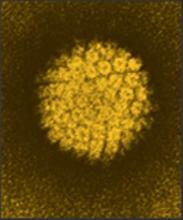in a large study, said Kahee A. Mohammed, MD, of Saint Louis (Missouri) University Center for Outcomes Research, and associates.
Messages to boost HPV vaccination rates may need to be targeted based on maternal education, non-Hispanic white ethnicity, and provider recommendations, the researchers said.
An analysis of data on 4,047 boys and 6,307 girls aged 13-17 years from the 2014 National Immunization Survey–Teen found several factors associated with parents’ intent to vaccinate teens for HPV. Among unvaccinated boys, independent variables were non-Hispanic black race/ethnicity (adjusted odds ratio, 1.89) and Hispanic race/ethnicity (AOR, 1.87), compared with non-Hispanic whites; mothers with less than a high school diploma (AOR, 2.41) or a high school diploma or general equivalency degree (AOR, 1.50), compared with mothers with a college education; never married mothers (AOR, 1.39), compared with married mothers; and a provider recommendation for HPV vaccine (AOR, 1.87).Among unvaccinated girls, independent variables predicting parents’ intent to vaccinate teens for HPV were Hispanic race/ethnicity (AOR, 1.57), compared with non-Hispanic whites; mothers with less than a high school diploma (AOR, 1.86), compared with mothers with a college education; and a provider recommendation for HPV vaccine (AOR, 1.38).
Also, mothers with some college education were more likely to intend to vaccinate their sons (AOR, 1.21), but less likely to intend to vaccinate their daughters (AOR, .69) than mothers with a college education.
About 7% of the survey respondents said “not sure/don’t know” regarding their intent to vaccinate their teens. The largest percentage had boys (66%), were non-Hispanic whites (47%), lived in the South (38%), lived above the poverty line (62%), the mother was a college graduate (31%), and had never received a recommendation for HPV vaccination from a health care provider (75%).
“Health care providers should actively engage in discussions with parents about HPV and strongly recommend the vaccine to all eligible patients concurrently with other routinely administered vaccinations to dispel any potential negative assumptions or opinions regarding HPV vaccination, especially among girls,” Dr. Mohammed and his associates said.
Read more at (Prev Chronic Dis. 2017. doi: 10.5888/pcd14.160314).


